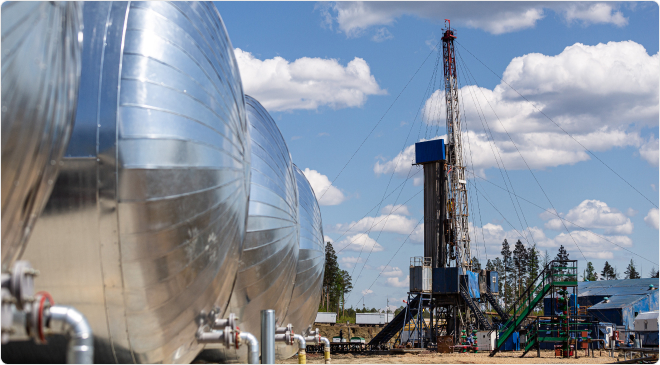Climate Change
The INK Group pays special attention to the climate agenda and understands the need to build an efficient system of climate management. The Group approved the Climate Strategy and the Decarbonization Strategy developed in alignment with the national goals of Russia, the principles of the TCFD and CDP and aimed at ensuring the Group’s operations continuity, mitigation of risks associated with potential consequences of climate change, and the transition to low-carbon economy. .
Working on the climate agenda, the INK Group is guided by the following principles:
- alignment of actions with the Group’s development strategy;
- considering the transition and physical risks and opportunities associated with climate change and the Net Zero transition;
- priority of a scientific approach to climate management;
- developing a sustainable supply chain and meaningful stakeholder engagement.
The Group is fully aware of the need to reduce the carbon footprint of its main products and is making efforts to diversify its business. Although the Group’s main business is oil, its strategic goal is to develop new areas of production in gas processing, including associated petroleum gas (gas chemistry projects, production of propane-butane, and helium) and extraction of associated water produced together with raw hydrocarbons (projects for extraction of useful components from brines). This will help reduce the share of carbon products in the Group’s revenue by replacing it with revenues from new businesses, building the Group’s competitive edge in the rapidly changing environment.

INK looks to minimize its emissions of greenhouse gases (GHG) and hazardous substances, and to introduce tools and mechanisms to monitor, measure, and reduce them.
GHG emissions reduction is one of the top-priority tasks in addressing the climate change challenge, and the INK Group joins the global effort. One of INK’s achievements in this regard is the implementation of the project for re-injection of associated petroleum gas into formation.

The INK Group consistently implements measures to increase utilization of associated petroleum gas (APG) that accounts for most of the atmospheric emissions. Boiler houses, compressor stations, and other facilities that will use APG are being constructed in accordance with the approved production program, while some facilities already operate on natural gas or APG.
The adopted Climate Strategy aims to enhance the efficiency of managing aspects related to the global warming and emerging physical and transition risks, and covers the following material topics:
1) assessment of the identified transition and physical risks across the INK Group under the SSP126, SSP245, and SSP585 scenarios;
2) the role of corporate governance, including the governance bodies system, in the efforts to identify and reduce the probability of emergence (realization) of climate risks;
3) developing a sustainable supply chain and stakeholder engagement on climate change.
The main objectives of the Climate Strategy in the mid-term (by 2023) and long-term (by 2050) are as follows:

A detailed description of approaches, principles, and other significant elements of the Climate Strategy is provided in the document:
The Decarbonization Strategy sets out the Group’s efforts in efficient management of the processes related to reduction of the carbon footprint of the Group itself and its products and covers the following material topics:
1) quantification of INK Group’s greenhouse gas emissions by three categories: direct emissions from sources owned by INK Group (Scope 1); indirect energy emissions from energy consumed by INK Group and procured externally (Scope 2); other indirect emissions (Scope 3);
2) results of benchmarking of processes carbon intensity of companies in the reference group;
3) key actions to achieve the Group’s value chain decarbonization goals;
The main objectives of the Decarbonization Strategy in the mid-term (by 2023) and long-term (by 2050) are accounted for in the Climate Strategy.
A detailed description of approaches, principles, and other significant elements of the Decarbonization Strategy is provided in the document:
 INK Group Decarbonization Strategy
INK Group Decarbonization Strategy
Efficient climate management is important not only for environmental conservation and development of the regions where the Group operates, but also for a resilient and sustainable future of the Group’s business. The Group has a risk management system that involves identification and reduction of the probability of risk, including climate-related ones.


